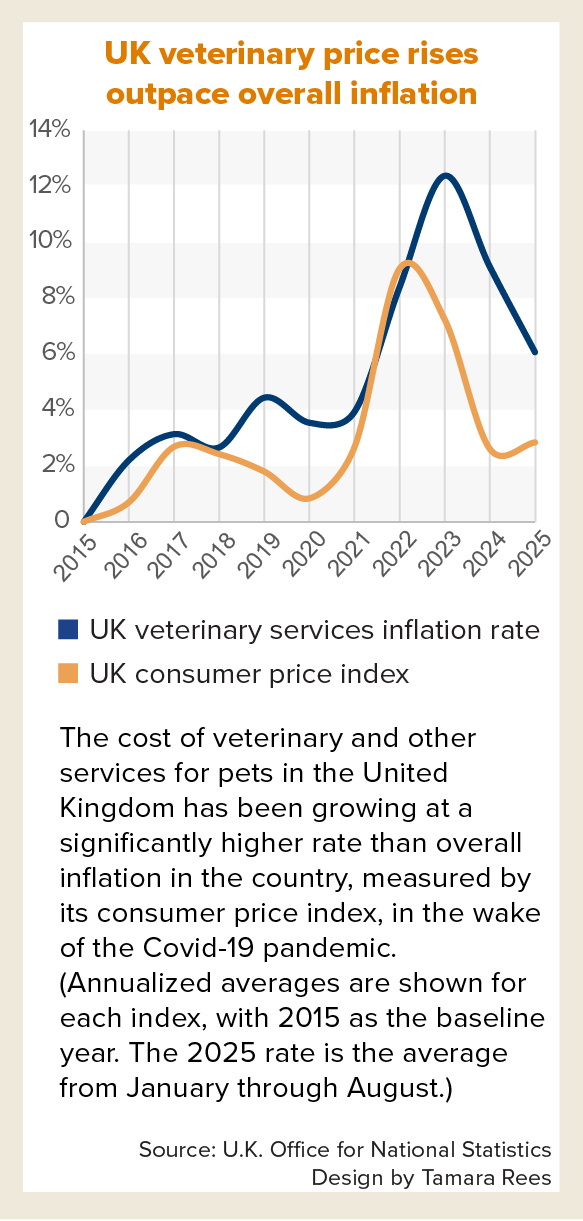 Listen to this story.
Listen to this story.
chart UK prices

Veterinary practices in the United Kingdom will have to state the prices of key services such as vaccinations, diagnostics and surgery up front, under provisional rules outlined today by the country's competition regulator.
The rules also include a requirement for practices to clearly disclose their ownership to the public and the imposition of a £16 (US$21) cap on prescription fees, which many veterinarians charge when clients purchase drugs from a third-party provider.
The U.K. government stopped short of imposing price controls on veterinary medicines — a possibility it had raised in May.
The provisional rules are scheduled to be finalized in March. In the meantime, the regulator, the Competition and Markets Authority (CMA), is inviting public comments through Nov. 12.
"Pet owners are often left in the dark, not knowing whether their practice is independent or part of a chain or what a fair price looks like," Martin Coleman, who chaired the rule review, said in a press release. "We are proposing major reforms aimed at bringing about a transformation in the experience of pet owners and empowering them to make the best choices for their circumstances."
The U.K. began a sweeping probe of pricing and corporate ownership levels in its veterinary profession in March 2024 amid a spike in the cost of care that had outpaced the country's overall inflation rate.
Upward pressure on the cost of veterinary care has been driven in recent years by a host of factors, including demand for more sophisticated levels of care and supply chain disruptions caused by the Covid-19 pandemic and war in Ukraine.
The CMA worries that high levels of ownership concentration in the profession have substantially weakened competition, causing pet owners to overpay. It estimates that six large consolidators — IVC Evidensia, Pets at Home, CVS Group, MediVet, VetPartners and Linnaeus, (the last a division of Mars Inc.) — together own more than 60% of general practices in the U.K. In 2013, around 10% were owned by large chains.
The CMA said today that it found pet owners pay 16.6% more, on average, at large veterinary chains than at independent practices.
Under the proposed new rules, practices would be compelled to publish prices on their website, for example, for a "standard list of services," according to a summary released by the CMA. The services would include consultations, vaccinations, neutering, microchipping, routine dentistry, common scans, diagnostics, surgical procedures, euthanasia and cremation.
The information would be collated on a price-comparison website produced by the Royal College of Veterinary Surgeons, the U.K.'s regulator for the profession. The data would later be made available to third parties who want to provide comparison services to pet owners.
"We expect there to be considerable interest in this data and that pricing outliers, including those businesses which cannot justify higher prices … would be highlighted, for example, by the media or by consumer groups," the CMA said.
Practices also would be obliged to provide an itemized bill "so that pet owners can understand what they have been charged for and compare it with any previous estimates or prices for similar services and identify any errors."
As for dispensing drugs, practices would have to give clients a written prescription to enable them to purchase medicines elsewhere if they wished. Pet owners would have to be informed that medicines are available outside the practice and "are usually cheaper online," the CMA said.
Veterinary prescription fees in the U.K. currently range from around £12 to £36, according to the CMA, which said that its cap of £16 is below the average of £20 but roughly equal to the average price charged by independent practices.
The new rules received a mixed response from the British Veterinary Association, which said they include "lots of positives," like "greater transparency of pricing and practice ownership," its president, Dr. Rob Williams, said in a press release. "However, we do have concerns that some of the measures outlined will impact how services are delivered."
In particular, Williams said, clarity is needed on the introduction of comprehensive price lists "because how vet care is delivered is varied and complex." Inflexible upfront disclosure conditions, he said, could end up confusing pet owners.
Separately, the CMA and the BVA both reiterated their support for an overhaul of the U.K.'s Veterinary Surgeons Act. The act dates to 1966, before nonveterinarians were able to own practices.
"It only regulates individual veterinary professionals and not vet businesses, despite the majority of practices being part of a large corporate group," the CMA said.
The RCVS has proposed a number of changes to the act that include giving it oversight of practices, as well as more controversial recommendations, such as allowing veterinary nurses to perform cat castrations and prescribe certain medications.